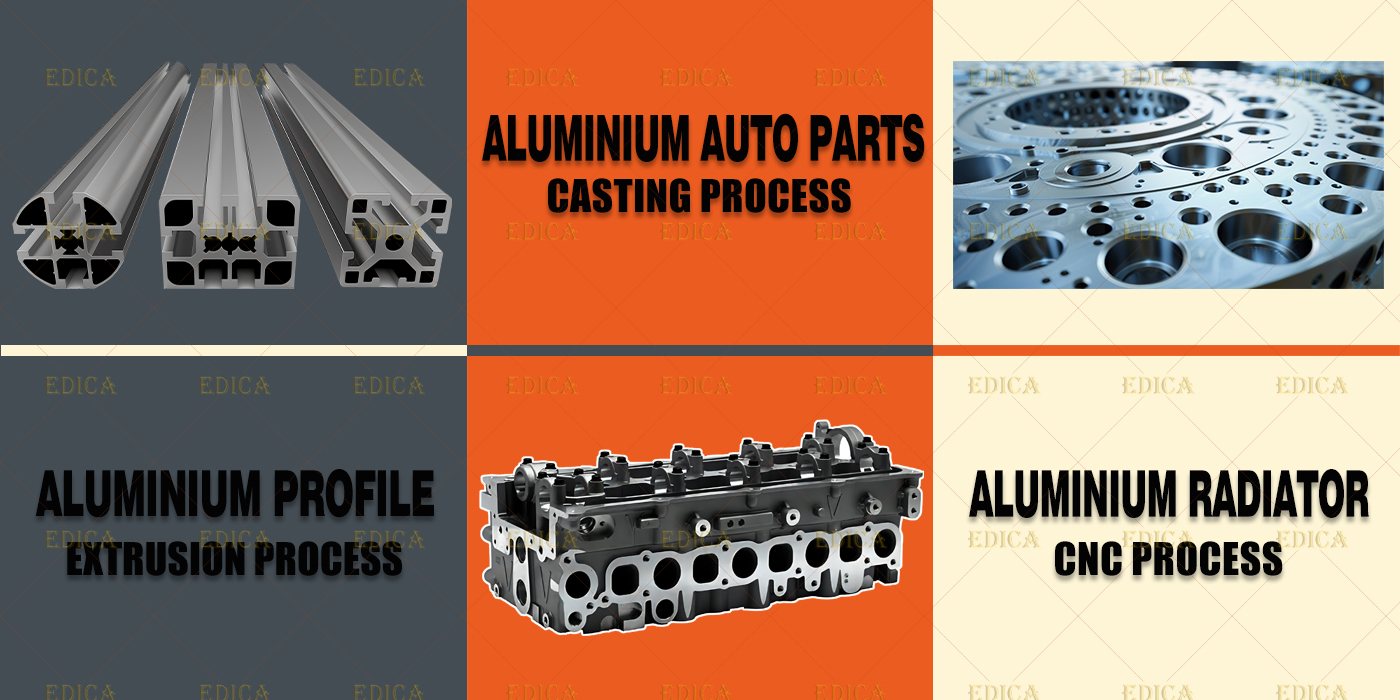High precision casting and CNC process all-aluminum auto parts
High precision casting and CNC process all-aluminum auto parts
| Brand Name | EDICA |
| Place of Origin | Hebei, China |
| Product name | Aluminum Profile |
| Material | Alloy 60 series |
| Technology | T1-T10 |
| Application | Windows, doors, curtain walls, frames, etc |
| Shape | Custom arbitrary shape |
| Color | Custom arbitrary color |
| Size | Custom arbitrary size |
| Finish | Anodizing, powder coating, 3Dwooden, etc |
| Processing Service | Extrusion, solution, punching, cutting |
| Supply Ability | 6000 T/ Month |
| Delivery Time | 20-25days |
| Standard | International standard |
| Characteristic | High strength, light weight, corrosion resistance, good decorative, long service life, rich color, etc |
| Certificate | ISO9001、 ISO14001、ISO45001、CE |
| Packaging Details | PVC film or carton |
| Port | QingDao、Shanghai |
All-aluminum auto parts have become increasingly popular in the automotive industry due to their lightweight, durable, and corrosion-resistant properties. These parts are commonly manufactured using casting and CNC processes, both of which offer unique advantages in producing high-quality components for vehicles.
The casting process involves pouring molten aluminum into a mold to create the desired shape of the auto part. This method offers several advantages, including the ability to produce complex and intricate designs with high precision. Additionally, casting allows for the creation of parts with thin walls and intricate geometries, making it an ideal choice for manufacturing lightweight components such as engine blocks, cylinder heads, and transmission cases.
One of the key advantages of the casting process for all-aluminum auto parts is its cost-effectiveness. By using reusable molds and producing parts in large quantities, manufacturers can significantly reduce production costs while maintaining high levels of accuracy and consistency. This makes casting an efficient and economical method for mass-producing aluminum components for automobiles.
Furthermore, the casting process enables the production of parts with excellent surface finishes, minimizing the need for additional machining or finishing processes. This not only saves time and resources but also ensures that the final products meet the required quality standards. As a result, all-aluminum auto parts manufactured through casting exhibit superior aesthetics and functionality.
On the other hand, the CNC (Computer Numerical Control) process offers its own set of advantages in the production of all-aluminum auto parts. CNC machining involves using computer-controlled machines to precisely shape and finish aluminum components according to exact specifications. This method is highly versatile and can be used to create a wide range of parts, from simple to highly complex designs.
One of the primary advantages of the CNC process is its ability to achieve tight tolerances and high levels of accuracy. This is crucial in the automotive industry, where precision and consistency are paramount. CNC machining allows for the production of all-aluminum parts with intricate details and precise dimensions, ensuring that they fit and function perfectly within the vehicle’s assembly.
Moreover, CNC machining offers exceptional repeatability, meaning that identical parts can be consistently reproduced with minimal variation. This level of consistency is essential for maintaining the quality and performance of all-aluminum auto parts across different production runs. Additionally, CNC machines can efficiently produce prototypes and custom parts, making them a valuable tool for automotive manufacturers.
In addition to precision and repeatability, the CNC process provides the flexibility to machine a wide variety of aluminum alloys, each with its own unique properties. This allows manufacturers to select the most suitable material for specific applications, whether it’s for structural components, engine parts, or body panels. By leveraging the capabilities of CNC machining, all-aluminum auto parts can be tailored to meet the specific requirements of different vehicle models and performance needs.
In conclusion, the combination of the casting process and CNC process offers numerous advantages in the production of all-aluminum auto parts. While casting excels in cost-effectiveness, complex geometries, and surface finishes, CNC machining provides precision, repeatability, and material versatility. By leveraging the strengths of both processes, automotive manufacturers can efficiently produce high-quality, lightweight, and durable all-aluminum components that contribute to the overall performance and efficiency of modern vehicles.
Our core competitive advantage
1、We can provide you with a variety of product design, production, transportation and other services.
2、We have a very professional team to ensure good quality and the lowest price.
3、We have excellent designers to provide customers with custom labels and custom packaging free of charge.
4、We can provide OEM production services according to customer requirements.
5、We can provide samples free of charge.
1. Are you a factory?
M: Yes, we are a manufacturer of aluminum extrusions from China.
2. Can you provide free samples?
M: Yes, we can provide samples of aluminum profiles free of charge.
3. Do you have quality assurance for your products?
M: Our products have passed ISO9001, ISO14001, ISO45001 and other international certifications. We have advanced testing equipment to ensure the quality of each batch of products.
4. Where is your company located?
M: We are located in Hebei Province, adjacent to Tianjin Port and Qingdao Port, which are important ports in China. Transportation is very convenient. You can also deliver goods to Shanghai Port.
5. Does your company support customization?
M: Yes, our company supports the customization of various aluminum alloy profiles and colors.





















